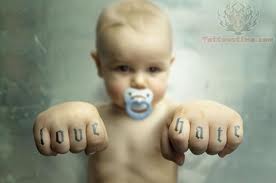Note: I suspect some of the words I write here will anger some of my friends and family. Nothing is as simply black and white as the few words I can fit into a blog post. And nothing can stir anger in people like a discussion of religious beliefs. If only tolerance was as hotly debated . . .
I was getting ready to post a benign essay about blogging and the difficulty of balancing on the thin line between blog-as-diary and blog-as-tutorial, when I decided to read the news first. The story about the passing of Fred Phelps, head of the Westboro Baptist Church was the article of the hour. The entire situation with his church has distressed and confused me for some time, but his death has brought me some clarity and I feel compelled to write about it. I realize how personal his vitreolic spewing seemed and wasn’t sure how to address this subject without getting too personal myself. During meditation I came to the understanding that this story is deeply personal – for everyone. I hope that there is relevance for Buddhists, Baptists, Muslims, Jews, Agnostics and Atheists alike.
Phelps cloaked his preaching on the hatred of gays in the mantle of Christianity. This seemed antithetical to me, but what do I know about Christianity, having been born into a Jewish family? The fact that I grew up without hatred for Christians is a bit of a mystery and a testament to my parents never speaking out against others. The fact that there was only one generation between me and my family members who suffered Nazi persecution could have pushed me either way – fostering either a deep understanding of the need for tolerance, or encouraging blinding hatred borne of fear and a desire for vengance. Luckily, my family chose the former.
I still remember the most popular boy in junior high leaning in close to ask me out on what would have been my first date. He glanced down and caught sight of my Star of David necklace. He ended up spitting in my face and then he and his best friend punched me repeatedly in the main hall while a large number of our classmates watched, not one coming to my aid. The assistant principal, the dreaded dispenser of discipline, looked on in silence. I also remember getting into an argument on my front lawn with my high school boyfriend over something that became immediately trivialized when he one-upped the argument by calling me a “Christ killer.”
As a school girl, I became curious about what this Christianity was all about that taught such words and brought on such actions of hate. I decided to attend church with school friends. The Baptist preacher disinvited me until I would agree to repent and be baptized. The Lutheran minister refused me even a blessing during communion when my friend’s father ratted me out. Not to be deterred, I turned to the Bible – not the old testament with which I already had a passing familiarity with its stories of vengance and smiting, but rather the New Testament. I read words of forgiveness and love and was left even more confused. And yet, these words led me to do a stint as a Christian. I was baptized as a Methodist and quickly turned to the Quaker faith because of its political activism and sitting in silence.
But still my questions about hatred towards our fellow humans weren’t answered. It took a Hindu to set me straight. Mahatma Gandhi encouraged us to love the sinner, hate the sin. This is advice I can stand behind. As far as I can tell, heathens and saints agree that we are flawed. It’s not our fault. But our actions don’t get off the hook so easily.
So, what do I think this has to do with the funeral-picketing, genocide-inciting Fred Phelps? I believe we need to find it in our hearts to forgive what I can only see as a very tortured man. In our hearts, let us pity a man who must have suffered so much fear and pain that his suffering boiled over and infected others. Condemn his acts while commending his ashes to a peaceful rest.
I do believe that Phelps’ funeral should be picketed – with signs of love, not hate, and with sympathy for his family and those who loved him. I hope his next life is full of love and compassion. I want to do this as much for myself as for him. I don’t want to spread his legacy of hate, but rather a message of tolerance and forgiveness.
